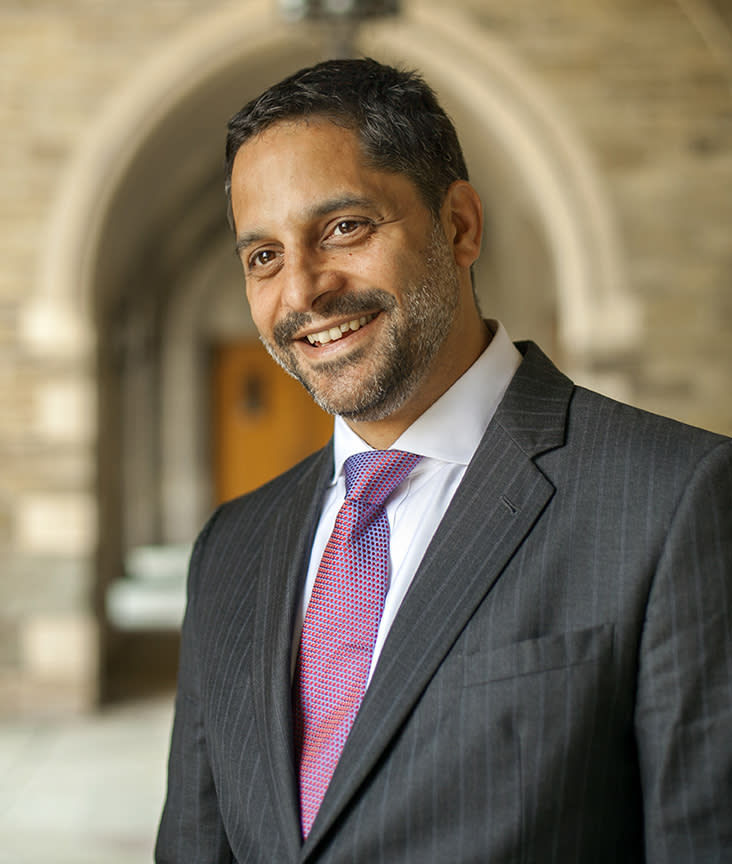A Latino 'first': From law school dean to college president
Growing up in Washington state, Eduardo M. Peñalver dreamed of exploring the skies and space. Longing to be an astronaut, he was a diligent student and in high school secured the nomination from his state’s senator needed to attend the Air Force Academy. But NASA was not in his future.
“I was preparing for my physical when I decided that this process was not the right path for me,“ Peñalver recalled. “Something didn’t feel right, so I changed direction and applied to Cornell to study history. I ended up far from astronaut training.”
That change in direction has led to some historic "firsts."

Peñalver, 47, was the first Latino dean of Cornell Law School, and he has now been named president of Seattle University, the first Latino and first layperson to head the Jesuit institution since it was founded in 1891. He begins next July.
For Peñalver, who is of Cuban heritage, his appointment as a university president is the latest step in a distinguished academic and legal career. He has been a Rhodes Scholar, a professor of law who clerked for Supreme Court Justice John Paul Stevens, and the dean of Cornell University’s Law School.
“This is uncharted territory, but we are all doing the best we can," Peñalver said of taking over during the pandemic. "As educators, we are all hopeful for a vaccine and hopeful that things can begin to get back to normal by next summer.”
Seattle University has approximately 7,000 students, with an undergraduate population that is about 12 percent Hispanic.
Nicole Piasecki, chair of the Seattle University Board of Trustees, said that the selection of Peñalver was “as enthusiastic as it as unanimous.” She praised him in a statement as “an innovative thinker” who is “passionate about the power of the university to make the world a better place.”
Peñalver credits his success, in part, to mentors, including the Stevens (“a kindred spirit”) and former Yale Law Dean Guido Calabresi. “I tell my students that your mentors do not have to look exactly like you. It is about their openness and interest in you,” he said. “For people of color in settings where there are not many of us, many mentors have to be different from us.”
Few Latino college presidents
Throughout his career, Peñalver said he has been used to being ”the first or the only” Latino. “I have always been aware of that reality; I’ve felt the responsibility to ‘represent’ so to speak. It has always been important to me to do my best, to represent our community well, so that there would be others.”
Recent studies and census data show that the number of Latino college students has been growing, and about 19 percent of U.S. college students are Latino. But in 2016, only 4 percent of college and university presidents were Latino, a figure that has not changed since 2001, according to the American Council on Education.
“The number of Latino college and university presidents has definitely not been rising proportionately to the growth in Latino students,” said Deborah Santiago, chief executive of Excelencia in Education. “But we have seen some appointments of Latinos to larger institutions and systems.” As examples, Santiago pointed to Felix Matos Rodriguez, chancellor of the City University of New York; Joseph Castro, chancellor of the California State University system; and Eloy Ortiz Oakley, chancellor of the California Community Colleges.
Santiago noted that in some states, such as Texas and Florida, there was a significant lack in the number of Latino college presidents relative to the growth of the states’ respective Latino student population.
“As higher education evolves, if we are going to look for diverse representation in leadership, colleges and universities will have to look outside the traditional places—such as among university provosts—where they find leaders,” Santiago said. This is an opportunity for qualified Latinos, she believes, as it holds the potential to bring people with diverse experience into educational institutions.
At Cornell Law School, Peñalver said he is proud to have created the Farmworker Legal Assistance Clinic, where student attorneys handle immigration and employment matters on behalf of the region's farmworkers, as well as having made changes that have allowed Cornell to provide financial aid to some immigrant students.
While he will be leaving Cornell Law next year, Peñalver hopes more Latinos will consider the legal profession. A 2018 report from the Hispanic National Bar Association found that only 4.2 percent of U.S. lawyers were Hispanic.
“The law is a great profession and a great way to have an impact. It offers an opportunity to participate in social change, and in the way our institutions are structured” said Peñalver. “The law is the architecture of our society, and to be a member of the profession is to have a privileged role in shaping that architecture.”
Peñalver is looking forward to returning to the Northwest as it will be a homecoming for him. “My parents still live in the house we grew up in. This job is more real to them than my time at Cornell because it is in their community, and they are very devout Catholics.”
Peñalver never gave up on his dream of flying. He obtained his pilot’s license and now flies with his sons. “So I stuck with aviation, on the private side,” he said. “We can go up and look at the leaves from the air, and that keeps me in a good place.”
Follow NBC Latino on Facebook, Twitter and Instagram.

